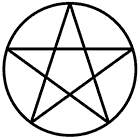Magic


Correctly categorizing magic may be as elusive as the art itself. Commonly, magic is perceived as either white magic or black magic. Black magic consists of the spells, charms, and potions that do harm and white magic of those that are either benign or do good. However, both black and white magic may slip into shades of gray, leaving those who try to classify it in a bedeviling fog of words.
Whether beguiling an audience with a stunning illusion or bewitching a single subject with a spell or a potion, magic is truly an art of enchantment based on the belief of its subjects. From extracting a quarter from a subject's ear to the success of "Love Potion #9", the subject's belief in the supernatural powers of the magician is intrinsic to all forms of magic. Modern magicians manipulate objects to beguile their audiences into believing in their supernatural powers and still today, in many cultures, sorcerers call upon the supernatural to cast spells and brew potions that manipulate the destinies of their subjects1.
While magic is often lumped into the paranormal category of divination, a considerable difference exists between the two. Divination is the art of prediction while the goal of magic—whether trick, spell, or potion—is not to predict change, but to affect change3.
For centuries, humans have tried to define magic, subscribing definitions to describe how it works. Scholars classify magic as sympathetic, contiguous, high, low, and make a distinction between supernatural magic and stage magic, the magic of entertainment1, 2, 3, 4, 5.
Sympathetic Magic
Based on the premise that "like produces like" an example of sympathetic or imitative magic is sticking a pin in a Voodoo doll to inflict pain upon a rival1, 3, 5.
Contiguous Magic
Almost the opposite of sympathetic magic, contiguous1 or contagious3, 5 magic combines a catalyst with the real effects of another such as the Aboriginal practice of putting glass shards or thorns in the footprints or a rival to inflict pain.
High & Low Magic
Both contiguous and sympathetic magic are forms of the simplest forms of magic, "low magic". The term "high magic" is reserved for ceremonial or ritualistic magic where practitioners use incantations, chants, and other sophisticated rituals to produce a result using special appurtenances such as robes, pentacles, perfumes, and potions3.
Stage Magic
Not necessarily ritualized, but certainly sophisticated, stage magic is magic for entertainment. Since medieval times, stage magicians have delighted audiences at fairs, circuses, and theaters with their bags of tricks and complex illusions2.
Joseph Pinetti (1750–1800), billed as the "Professor of Natural Magic" and famous for his escapes and complex tricks is famous as the first "modern" magician2. However, historians consider the "Golden Age" of stage magic as occurring later, from the 1880s to around 1930 when magicians such as the first magician to saw a woman in half, P.T. Selbit (1881–1938), escape artist Harry Houdini (1874-1926), and master illusionist Harry Blackstone, Sr. (1885–1965) reigned supreme.
Yet, today, contemporary stage magicians such as Harry Blackstone, Jr., Siegfried and Roy, Doug Henning, David Copperfield, Penn and Teller, and James ("the Amazing") Randi continue to enthrall audiences with ever grander tricks and illusions.
The Many "Faces" of Magic
Like beauty, magic is in the eye of the beholder, slipping from alias to alias at the whim of its definer. Called "the black art", "necromancy", "prestidigitation", "sleight of hand", "sorcery", "witchcraft" and "illusion"6, magic also has close kinship with religion1, 4, 5. Whether the effect results from prayer to divine powers or incantation to dark powers, both the power of magic and the power of miracle are based on belief.
Magick
The alternative spelling magick was popularized by occultist Aleister Crowley (1875-1947).
See also: Famous magicians & wizards
2. “Magic, in Entertainment.” The Columbia Encyclopedia. Questia, 2008. 3 Nov 2008 <http://www.questia.com/read/112871633?title=Magic%20%2c%20in%20Entertainment>
3. Jacqueline Simpson & Steve Roud. “magic .” A Dictionary of English Folklore. Oxford UP, 2000. 3 Nov 2008 <http://www.highbeam.com/doc/1O71-magic.html>
4. Gordon Marshall. “magic, witchcraft, and sorcery .” A Dictionary of Sociology. Oxford UP, 1998. 3 Nov 2008 <http://www.highbeam.com/doc/1O88-magicwitchcraftandsorcery.html>
5.Robert S. Ellwood. “Magic (sorcery).” Microsoft® Encarta® Online Encyclopedia 2008. 2008. 3 Nov 2008 <http://encarta.msn.com/encyclopedia_761578842/Magic_(sorcery).html>
6. Antony Lewis. Magic .Word Web Pro. 2007 Princeton University 2006. 3 Nov 2008
